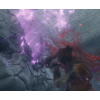The systemic failure of stealth games, by Robert Yang
http://www.blog.radiator.debacle.us/2015/07/the-systemic-failure-of-stea...
Invisible Inc. is the murderous serial killer cyborg that does not run after you. Instead, it calmly walks toward you, which is somehow even scarier. There is no pretense of "ghosting" being the optimal play style here... in many cases, you will have no choice but to be detected, to KO a guard, or to set off an alarm. Some characters become more powerful only when shit is hitting the fan. Getting detected is not failure here -- what's worse is getting detected at the wrong time.
So, this article essentially describes what kind of stealth game I'd like AC to become. Not exactly like Invisible Inc, but with that same sense of needing to find the right moment to commit yourself to the task at hand, and put yourself in danger in order to win.
Funny that this article talks about how in love the author is with Thief 1 - because I'm actually playing that game right now and enjoying my time with it immensely!
EDIT: Now that I've finished reading, I'm in support of the ideas presented. Stealth hasn't really evolved a lot over the years - the best evolutions were things like better controls, more fluid gameplay, and multiple options rather than single-solution puzzles. A bigger stress on "pick your moment, strike when the time is right" would work really well for a game like Assassin's Creed, even if it doesn't use our ideas of expanding it to more than just "stab that dude over there."
Even if the game remains about stabbing the dude and nothing else, having a system like this could be really cool - provided that the Assassin doesn't just switch to combat mode as soon as guards detect you, making him unable to do one-hit kill stabs on the target during that "selected moment of exposure." There's nothing that irritates more, and it's part of the reason I hate the AC combat-stealth dichotomy so much. When I'm running toward a target surrounded by guards, I'd really like to be able to stab him once and flee if I wish, I'd rather not flail at him mercilessly for a few moments before he decides to go down. For one, it makes the Target feel like any other guard, and that's not special or unique in any way - though you might argue that's the point.
Of course, a lot of this could be solved by making combat not so separate from regular movement, without switching into a separate "Mode," or with making combat in general as quick and snappy as movement and assassination. As an aside, my previous suggestion of guards being too shocked or surprised to react quickly would probably add flavor if not genuine depth to the decision of exposing yourself purposefully especially if Disguises are involved. A moment of hesitation is all it takes to suffer a Hidden-Blade-to-the-everything.
I think that's a good point. To make "detection" feel less like a failure state, it would make sense for your method of aggression to stay the same regardless of if you've been seen or not.
Right now aggression while in stealth is balanced to be very powerful, require very little input, and for stealth in general to be something the player can recede into with ease if they're caught.
In combat it's meant to overwhelm the player and turn them back to the stealth state, mostly through frustration and friction: "this is taking too long and I'm getting hurt, so I better run."
So what you'd need to get rid of the intense stigma or messaging about there being two discrete modes is something in-between that: an efficient and powerful method of dealing with enemies that requires a greater amount of skill and input than stealth takedowns, but requires less time commitment and provides less friction than traditional combat.
So it stops being about trying to stay in the "safe" mode, and more about finding the correct entry point to begin playing in the only mode there is, with decisions like who to kill, spare, and reveal yourself to being based on "what will allow me to live long enough to complete my objective and escape?" rather than "what do I feel like doing?".
It would be less of a micro-scale sandbox because there would be more defined mistakes and bad choices that could lead to failure in the short term, but on the macro-level the importance of assessing the components of a level would lead to more value in how you choose to initially approach the environment, what paths you plan out.
Even if the game remains about stabbing the dude and nothing else, having a system like this could be really cool - provided that the Assassin doesn't just switch to combat mode as soon as guards detect you, making him unable to do one-hit kill stabs on the target during that "selected moment of exposure." There's nothing that irritates more, and it's part of the reason I hate the AC combat-stealth dichotomy so much. When I'm running toward a target surrounded by guards, I'd really like to be able to stab him once and flee if I wish, I'd rather not flail at him mercilessly for a few moments before he decides to go down. For one, it makes the Target feel like any other guard, and that's not special or unique in any way - though you might argue that's the point.
One really annoying part for me was trying to assassinate a fleeing Marie, only to draw out the main weapon because of the alerted guards around Arno.  It was a lot better in the older games where you would have your assassinations blocked as Altair, or use the hidden blades as a combat weapon after the grace period of last second stabs. There were also those running combat kills that I think both AC3 and Black Flags had.
It was a lot better in the older games where you would have your assassinations blocked as Altair, or use the hidden blades as a combat weapon after the grace period of last second stabs. There were also those running combat kills that I think both AC3 and Black Flags had.
So what you'd need to get rid of the intense stigma or messaging about there being two discrete modes is something in-between that: an efficient and powerful method of dealing with enemies that requires a greater amount of skill and input than stealth takedowns, but requires less time commitment and provides less friction than traditional combat.So it stops being about trying to stay in the "safe" mode, and more about finding the correct entry point to begin playing in the only mode there is, with decisions like who to kill, spare, and reveal yourself to being based on "what will allow me to live long enough to complete my objective and escape?" rather than "what do I feel like doing?".
It would be less of a micro-scale sandbox because there would be more defined mistakes and bad choices that could lead to failure in the short term, but on the macro-level the importance of assessing the components of a level would lead to more value in how you choose to initially approach the environment, what paths you plan out.
Yes! I've been thinking about something you said a while earlier, and I've been liking the idea of it more and more. Which is the following; Lessening micro-scale Choice is 100% fine. I'll explain why by contrasting Thief 1 and Dishonored, which are extremely alike in every regard except this one. Thief 1 doesn't give the player as much choice as something like Dishonored - but that's because Dishonored's protagonist is playable in different ways, thereby becoming a different expression of the same Character - whereas Thief's protagonist is playable in only one way, and the character can be expressed in only that way. The mechanics and gameplay set this tone, or more accurately allow the player to set it themselves. The reason you can play as a crazy warrior Corvo or a ruthless assassin Corvo, or a pacifist ghost Corvo is because all of those are possible Corvos. Garrett does not work like this. There is only one Garrett. He is a thief, not an assassin or a fighter, therefore the gameplay simply disallows you from playing Garrett effectively any other way. Even if you play him as a fighter or killer, it becomes significantly harder, to the point where you can tell that you're still a thief through and through.
Here's my problem, I like Choice, but I like Choice that keeps the player grounded within the Body and Soul of the Character they are currently inhabiting. I don't know how to elaborate the difference between those two different "Types of Choice" in mechanical or gameplay terms. The simplest way is to echo something of what you used to say - I don't want to remove the element of player Choice or Freedom of Expression in Assassin's Creed, but I would like to tighten it and make all of that expression meaningful. When you can genuinely approach a situation in an INFINITE number of ways, all of those methods entirely lose meaning. When you can approach a situation in three or four different, character-appropriate ways, all of which are NOT pre-set by the game* it truly feels like you're both forging your own player-unique path, and still staying true to the character.
There are some choices that the Assassin would not have. The player should have access to them, but so unwieldy or difficult to execute that they're never practical - similar to Garrett having his Sword or Lethal/Broadhead Arrows in Thief 1. You can use them, certainly - we don't lock you out of that. But the reason the developers allow the player to use those impractical Choices is to purposefully set a contrast between the "right" way to play, and a way to play that will get you killed.
* (as is the case in Deus Ex: Human Revolution - each choice was strictly, rigidly defined - vent, hack, stealth, fight; Dishonored is more organic)
It was a lot better in the older games where you would have your assassinations blocked as Altair, or use the hidden blades as a combat weapon after the grace period of last second stabs.
This is worth noting, yeah. The previous games did a much better job of maintaining immersion. A real Assassin would still try for a stab - and that's actually WHY it feels so OFF to me. Arno WOULDN'T just randomly pull out his weapon and start wailing on an unarmed, helpless Target that would be killed much more expediently with his Hidden Blade. It just doesn't make sense to me, to whip out my sword in the middle of a chase when my taps of Square should mean no more than, "She's running, her back is to you, jump on her and get her in the neck." Whenever Altair or Ezio's arm was caught and they were thrown off by a Guard or Target who'd JUST detected you or you'd struck JUST a moment too late, that always caught me by surprise and it was a really cool feeling. Compare that with how it would feel if they just took out their Sword and started hitting the target immediately a la Unity. Sometimes Streamlining is not good, not when it breaks immersion like that. I understand that this is one of the Flaws of not having separate Selectors for your Hidden Blade and Primary Weapon. Still, it doesn't make it okay. It's essentially the Game telling me, "Right, you messed up, so here we'll neatly put your sword in your hand for you and just uh... Keep uh, K-Keep doin' what you're doin'..." It's like it's not content with allowing me to feel the fallout of my own mistakes. I'd prefer the person I'm aiming for block my Hidden Blade/throw me off. Heck, we do that to Thomas de Carneillon in the Prologue, but god forbid the game lets Guards do that to us xD
Yet another good reason for the hidden blade to be the only melee weapons Assassins carry! 



